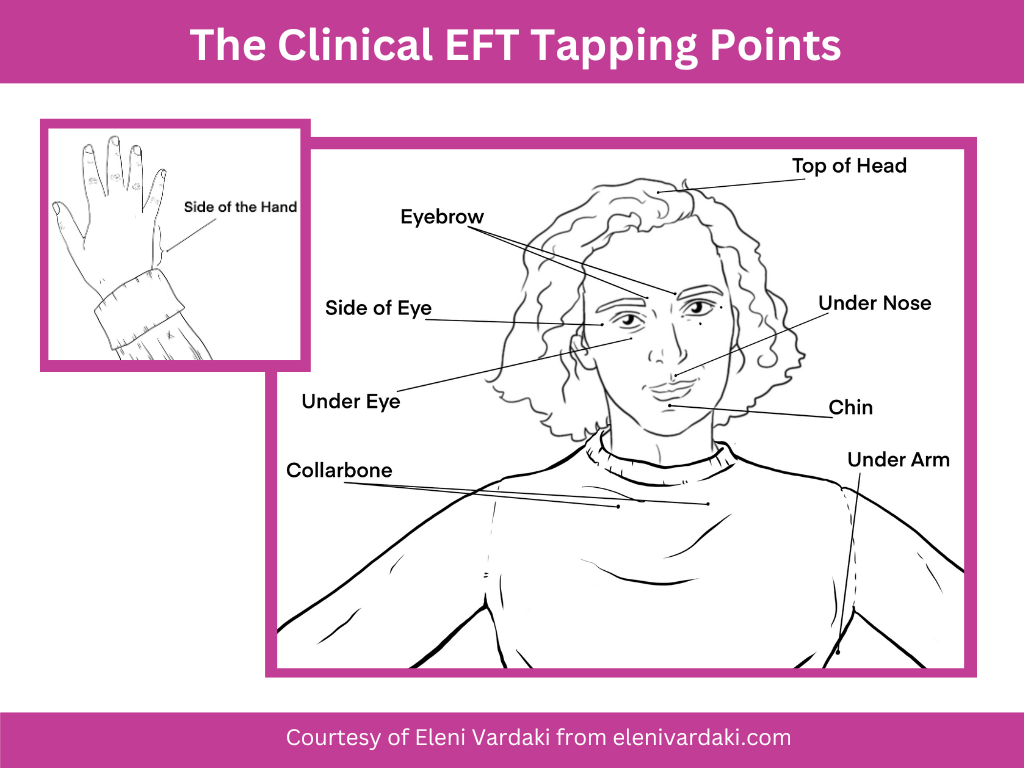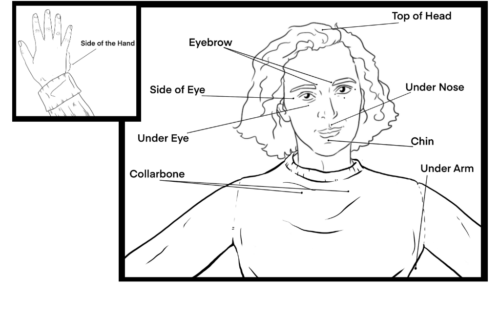
EFT Tapping for Loneliness, Belonging, Social Confidence, And Change
WHAT’S UP: Learn how EFT Tapping can help you with relieving loneliness, explore your sense of belonging, social confidence blocks, and doubt that you can change. In these four short educational videos, you will learn four ways that you can integrate EFT Tapping meditations into your daily self-care routine.
EFT (Emotional Freedom Techniques, also known as just ‘Tapping’) is a collection of stress management techniques. It’s practiced daily for self-care by kids and adults all over the world. Tapping meditations can assist us with navigating a wide range of life stressors and strains. EFT has been around for more than 40 years and researched now for more than 20 years. The 250+ published journal articles show it positively affects a range of biochemistry in the body related to stress reduced stress and improved well-being (e.g. positive changes in brain activity, cortisol, and DNA expression).
You will find a reference list at the end of this article if you would like to learn about some of the research papers I referenced above.
Disclaimer: At no point should EFT be substituted for traditional medical care. All information and self-help exercises are provided as general knowledge and viewers need to take their own responsibility for their health and getting help when needed.
HOW CAN WE DO EFT TAPPING FOR SOCIAL AND EMOTIONAL SELF-CARE?
When we tap through the Clinical EFT Tapping sequence points, we can start by tapping on the Side of the Hand (see below) to help us ‘tune in’ to how we are feeling about a particular issue or problem. What is the pre-tapping intensity? Where in our body do we feel the distress? This gives us a measure

We then tap through the 8-point sequence, either starting at the Top of the Head or at the Eyebrow point (your choice) to start acknowledging and processing our negative thoughts and feelings. The more specific we are with the words we choose, the better EFT works.
Below you will find four examples of how you can use specific words or phrases to help you make a start in processing your negative thoughts or feelings. As with all EFT activities, if any of these words don’t feel true or resonate for your particular situation, you can just change them to something that more accurately describes what you are experiencing in any given moment.
Of course these exercises are only for self-care purposes. If you want to go deeper on clearing the roots of a problem, you can seek the assistance of a qualified EFT Practitioner/Coach who can help you make the changes you want in your life by working together to clear your inner blocks to change.
1. EFT TAPPING MEDITATION FOR LONELINESS
Tapping when we feel lonely not only has self-soothing stress management benefits (as we know, loneliness causes stress).
Reducing our stress response while thinking about the problem helps us take positive action in the direction we want to go rather than being held back by negative thinking of feelings that predispose us to a negative future outcome.
In this EFT Tapping for loneliness exercise, I lead you through two rounds of tapping that you can have a go at if you are tired of feeling lonely and ready for a change.
2. EFT TAPPING MEDITATION FOR BELONGING AND NOT FITTING IN
Another way you can practice EFT Tapping for self-care is to tap on any thoughts or feelings that come up when an incident triggers a sense of not belonging.
3. EFT TAPPING MEDITATION FOR SOCIAL CONFIDENCE
If you want to have more social contact, but fear is stopping you from initiating an interaction so that you can meet new people, try this simple self-reflection exercise.
Just tap and ask yourself these key questions as you move through the 8 Clinical EFT Tapping sequence I demonstrate in this short educational video:
- “What do I fear?”
- “Rejection?”
- “Conflict?”
- “Other people’s judgement?”
- “What if I say hi?”
- “What if I don’t?”
- “What if I do?”
- “What if I say hi?”
Then take a nice breath in, exhale. And notice what come up for you. Feel better at the thought of starting an interaction with someone you don’t know? Any new insights?
If you notice resistance coming up for you, possibly even skepticism or doubt that you can ever change, the next EFT Tapping self-help exercise may help you explore that resistance.
4. EFT TAPPING MEDITATION FOR DOUBT THAT YOU CAN CHANGE
Being alone is different from being lonely. You can feel lonely while in a crowd of friends. Share this simple but powerful self-care exercise with friends or family who have told you they feel lonely.
Remember that these are all just self-care exercises. And just as you would never assume that brushing and flossing your teeth is enough for oral hygiene (yes, we do need to go to the dentist for preventative care and assistance!), sometimes seeking the assistance of a professional EFT Coach/Practitioner is needed to help you change your life, belief and habits.
It’s totally normal to experience doubt or skepticism that we can change, particularly if you have tried many times and memories of all the times you failed come up as you tap. In EFT Coaching sessions, we can explore any self-doubt or skepticism with the grounding influence of the tapping sequence to help you clear this inner block to change.
There’s no shame in seeking professional assistance. We all have blind spots. It’s normal to sometimes need help to get to where we want to go. If you are stuck and want to move forward with more ease, get help.
SOME FINAL SELF-REFLECTION QUESTIONS
- What’s your biggest takeaway from this article?
- Which of these EFT meditations have you tried so far for your self-care?
- Have you got any questions?
REFERENCES & EFT RESEARCH TO EXPLORE
- Anastasia, et al (2013) “Effect of the Emotional Freedom Technique on perceived stress, quality of life, and cortisol salivary levels in tension-type headache sufferers: A randomized control trial”, Explore, Vol 9.
- Bach, et al (2019), “Clinical EFT (Emotional Freedom Techniques) improves multiple physiological markers of health”, Journal of Evidence-Based Integrative Medicine, Vol 24
- Church, et al (2012) “The Effect of Emotional Freedom Techniques on
Stress Biochemistry: A Randomized Controlled Trial”, The Journal of Nervous and Mental Disease, Vol 200 - Stapleton, et al (2020) “Reexamining the Effect of Emotional Freedom
Techniques on Stress Biochemistry: A Randomized Controlled Trial”, Psychological Trauma: Theory, Research, Practice, and Policy
- Stapleton, et al (2018) “An Initial Investigation of Neural Changes in Overweight Adults with Food Cravings after Emotional Freedom Techniques”, OBM Integrative and Complementary Medicine Journal, Vol 3.
- Stapleton, et al (2022) “Neural changes after Emotional Freedom Techniques treatment for chronic pain sufferers”, Journal of Complementary Therapies in Clinical Practice, Vol 49
- Wittfoth, et al (2022) “Bifocal emotion regulation through acupoint tapping in fear of flying”, Journal of NeuroImage: Clinical, Vol 34
- Wittfoth, et al (2020) “Emotion regulation through bifocal processing of fear inducing and disgust inducing stimuli”, BMC Neuroscience Journal, Vol 21.
- Maharaj, M. (2016) “Differential gene expression after Emotional
Freedom Techniques (EFT) treatment: A novel pilot protocol for salivary mRNA assessment”, Energy Psychology, Vol 8. - Church, et al (2018) “Epigenetic effects of PTSD remediation
in veterans using Clinical Emotional Freedom Techniques: A randomized
controlled pilot study”, American Journal of Health Promotion, Vol 32.
About the author

Eleni Vardaki works with individuals and schools, offering services and package deals that support parent, teacher, and student well-being. Her business mission is to help bridge the gap between mainstream education systems and the well-being skills we need to thrive. She believes that if we care about student well-being, it makes sense to also care about the well-being of those who care for them. If you want to book an obligation-free introductory meeting to see if it’s a match, you can email her at eleni@elenivardaki.com
EXAMPLES OF LIVE EFT SESSIONS
- Group tapping online – Eleni working with a final year of university student academic and EFT coaching: “Final Exam Stress, Tapping into Confidence”
- 1:1 therapeutic coaching online – Eleni working with a final year adult student (advanced yoga instructor exams), “Tapping Away Exam Stress and Study Procrastination”








